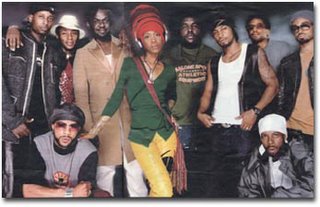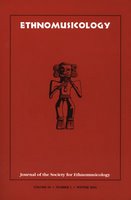
when i put together my
crunk genealogy mix, i wanted to keep it short and sweet. of course, i could have included many, many more tracks that sample/version the kraftwerk and bambaataa creations that so swiftly spread the electro/bass/crunk meme 'round the planet--not to mention the hundreds of tracks (including plenty of
3:2 clave salsa, son, calypso, and reggaeton) that share the same prevailing rhythmic pattern. ever since i put it up, though, i've been weighing the decisions and wishing i'd also included this or that. and now, especially with
earplug sending lots of folks to listen to it (thanks, y'all), i'm wishing that i had.
still, sometimes it's best to let things lie. first thought, best thought--and all that
jazz zen. so i'll just hip you to a couple tracks that i have since wished i'd included.
the first comes to us from the
dearly departed detroiter, j dilla. talk about reppin' the D, the birthplace of techno--that afrofuturist hybrid bringing together bambaataa, kraftwerk, parliament, and all sorts of other folks for whom space-is-the-place: on
welcome to detroit, jay dee riffs on kraftwerk's seminal "trans-europe express" (whose drums and melody helped to animate bam's/baker's "planet rock") and resignifies "BBE" (the label that issued the album) as "big booty express." rather than sampling kraftwerk or replaying elements from "TTE," on "BBE" - just as his detroit bredren cybotron (a/k/a juan atkins), one of techno's early technicians, did on jams like "clear" - jay dee expertly channels the teutonic/robotic spirit of the original, employing vintage synths and a foursquare beat. and, in a nod to electro's migrations down south (e.g., miami's [booty] bass and ATL's crunk) before heading back up north (e.g., detroit's ghetto-tech), he makes direct reference in the refrain to the large, lovely posteriors--
i cannot lie / you other brothers can't deny--that inspire so many bass/crunk/tech songs which, yes, have strong roots in stripclub music and culture. (as
did jazz jass, let's not forget)
jay dee, "B.B.E. (Big Booty Express)"the second springs from the caribbean, though i'm not sure where exactly. you see, the music is soca, which today is largely recorded in trinidad and in its most longstanding site of production, new york. but the singer,
alison hinds, is from barbados. a bajan singing soca is nothing to be surprised by, of course, which is actually kind of remarkable. when we consider, for example, that reggae performers - at least those that are popular in jamaica and in the international market (for, yes, reggae is produced
everywhere today) - are far and away jamaican, it becomes noteworthy that soca - as heard in trinidad and in the international soca market (which does not quite have reggae's reach) - seems to support so many non-trinidadian performers. perhaps it says something both about jamaica's intense pride and projection of national identity (despite the inherent
contradictions therein), and perhaps it says something about west indian unity outside of jamaica. at any rate, soca's
biggest recent star hails from st.vincent, while runner-up
rupee represents yet another bajan leading the scene.
and hinds just may have what it takes to appeal to the "
international market" she's had in her sights for a while. although, like most soca songs that eventually reach the US, her song "roll it gal" is arriving
many months late, they've been caning it over on
"rockers" on WERS--and that's a (mad decent) reggae show. a good part of what allows her song to work on a reggae program is its
ravesploitation-synth line and crunk beat, the same sort of thing
sherburne was hearing in lil jon last winter. it sounds like contemporary hip-hop and dancehall (and funk carioca and ethnopop, etc.), if with a slightly different accent. and you can't argue with an independent woman anthem. you just can't.
alison hinds, "roll it gal"///
as another crunk addendum, i point you to my
latest post at riddim method, where i offer up a number of
musical examples from my
electro class. the last one is a standalone version of jason moran's and bambaataa's "planet rocks" (in part, a response to
rio's good good continuation of the conversation).
///
finally, i certainly could have included a hyphy song on the
genealogy mix as well. i mean, if that's not the crunk o' the bay, owknow what is. check out the way dudes from the yay have been representin' recently on a previous post of mine
that mentioned hyphy. hella hardcore. what's more--i think the first guy signed up with blogger just to leave that comment. that's representin' for real, mang. luh dat.
























